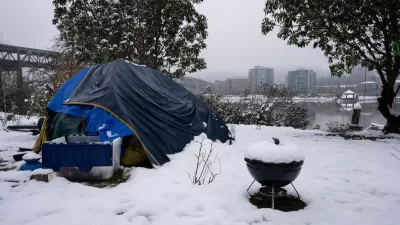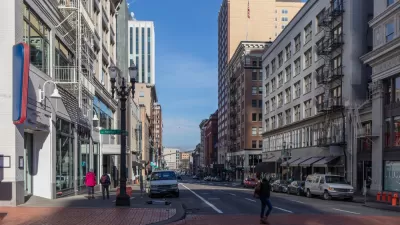Car registration statistics from Multnomah County show passenger vehicle ownership is less popular among its growing number of residents. The residents forgoing cars have done themselves a favor in more ways than one.

Michael Anderson has written a pair of posts to calculate the effect of reduced car ownership in Portland, Oregon. According to the premise of both articles, about 38,501 additional cars would be on the road in Portland if residents owned cars at the same rate as in 2007.
The first post, published in June, calculated and visualized the amount of space the reduced car ownership gains the city. For that record, "that’s everything between NE Killingsworth, Skidmore, Rodney and 16th," or "it’s the entire Foster-Powell neighborhood west of SE 73rd Avenue," among other large swaths of the city.
Andersen's newest post focuses on "the money that isn’t being spent to move, maintain, insure and replace all those cars." For each of the 38,501 cars, Andersen calculates a savings in insurance, purchase, and taxes and fees to produce a "very low estimate of direct car ownership costs per year" totaling $2,178. "So just by not owning 38,501 cars that they would have owned in 2007, Multnomah County residents are saving $83,855,178 each year to spend on other things instead," concludes Andersen.
Andersen the imagines a wish list of big ticket items that could be paid for with the money saved on reduced car-related spending, including eliminating tuition at Portland Community College, building out the entire bike plan for the city, or nearly eliminating fares on the TriMet transit system.
FULL STORY: Portland’s drop in car use frees up $138 million in our local economy every year

Maui's Vacation Rental Debate Turns Ugly
Verbal attacks, misinformation campaigns and fistfights plague a high-stakes debate to convert thousands of vacation rentals into long-term housing.

Planetizen Federal Action Tracker
A weekly monitor of how Trump’s orders and actions are impacting planners and planning in America.

San Francisco Suspends Traffic Calming Amidst Record Deaths
Citing “a challenging fiscal landscape,” the city will cease the program on the heels of 42 traffic deaths, including 24 pedestrians.

Defunct Pittsburgh Power Plant to Become Residential Tower
A decommissioned steam heat plant will be redeveloped into almost 100 affordable housing units.

Trump Prompts Restructuring of Transportation Research Board in “Unprecedented Overreach”
The TRB has eliminated more than half of its committees including those focused on climate, equity, and cities.

Amtrak Rolls Out New Orleans to Alabama “Mardi Gras” Train
The new service will operate morning and evening departures between Mobile and New Orleans.
Urban Design for Planners 1: Software Tools
This six-course series explores essential urban design concepts using open source software and equips planners with the tools they need to participate fully in the urban design process.
Planning for Universal Design
Learn the tools for implementing Universal Design in planning regulations.
Heyer Gruel & Associates PA
JM Goldson LLC
Custer County Colorado
City of Camden Redevelopment Agency
City of Astoria
Transportation Research & Education Center (TREC) at Portland State University
Jefferson Parish Government
Camden Redevelopment Agency
City of Claremont





























